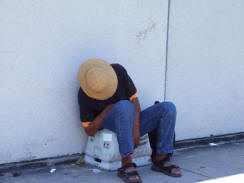Spanish hotels to cash in on Siestas by the hour

The siesta is making a comeback, recycled for the modern world as “Iberian yoga”. Far from the afternoon snooze that consumes valuable working time, Spain’s siesta is being re-branded as essential for spiritual wellbeing and a balanced life.
Long hailed as the country’s greatest contribution to civilisation, the siesta – “Spain’s secret weapon”, according to this weekend’s ABC newspaper – is being re-launched in Seville.
Hoteliers in the southern hotspot are trying to lure visitors back from the beach by offering rooms between 3pm and 7pm at 30 per cent of the normal rate, to slumber through the hottest hours. The idea is that you emerge refreshed to enjoy the late afternoon, sunset and after dark, which Spaniards savour as the best time of the day.
As part of the campaign, which has adopted the slogan: “After eating I sleep”, you can even book your afternoon snooze from the very restaurant where you enjoy your leisurely, wine-soaked lunch. That way you don’t hit the road in an alcoholic haze – a disproportionate number of Spanish motoring accidents take place after lunch – or stumble back to the office half asleep.
“Every decent lunch deserves a period of repose or rest afterwards. and every day in this hot season needs a period of refreshment for the mind,” Manuel Otero, president of the Association of Sevillian Hoteliers, said.
Many visitors wilt in high summer because they don’t pace themselves. “Midday in the summer in any Spanish city breaks the will of the most determined and stubborn person,” he added. Spanish summers are becoming increasingly ferocious, imposing an afternoon pause on those both at work and play. Hoteliers say their campaign, organised jointly with the city’s restaurants, represents a flexible solution to a slack season.
The initiative has been greeted with scepticism by the region’s Hostelry Union because it implies extra work for its members. “It could be a way of dignifying the old custom of hiring hotels by the hour,” a spokesman said.
Experts believe the optimal siesta is around 20 minutes long. Shorter and you don’t disconnect sufficiently, longer and you emerge groggy and bad-tempered. Even companies recognise their workforce performs better after the break. Many, including nationwide courier service MRW, have set aside soothing siesta zones with reclining chairs for their employees to snatch 40 winks.
The siesta, enjoyed by generations of Spaniards, has been described as ‘Spain’s secret weapon’ Spain tried to abolish the siesta in the 1980s before joining the EU, and two years ago in response to a globalised economy. Employers now prefer to rehabilitate the ancient custom, once denigrated as Mediterranean sloth, as “Iberian yoga” – a term originally coined by the Nobel Prize-winning writer Camilo Jose Cela – and make it part of modern life, as essential as the creche, the gym and company-funded language classes.
The best siesta is recognised to be “in pyjamas” and with a companion, but that remains for most a weekend luxury.